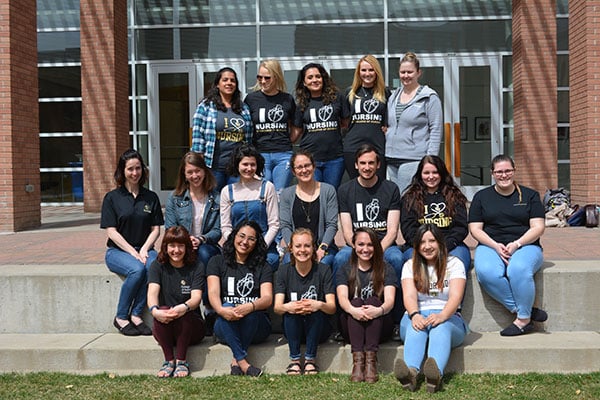The impact of coronavirus on our students has been far reaching. Clinics and inpatient facilities where our students typically complete their clinical hours shifted their focus to caring for coronavirus patients and suspended training.
“In an overabundance of caution, and in accordance with being good stewards of PPE, our hospital/clinical partners wanted to contain the spread of the disease and thought one of the best ways to do so was to limit the number of people in their facilities,” said Tammy Spencer, DNP, the Interim Assistant Dean of CU Nursing’s undergraduate program.
Consequently, our students and faculty were in limbo.
Crisis Leads to Creative Solutions
Faced with an internal crisis, faculty and staff retooled our programming and discovered new ways to help students complete the necessary clinical requirements. “Partners that we had not relied on heavily before, stepped up. And we are grateful,” said Senior Director of Experiential Learning Fara Bowler, DNP. Aurora Public Schools took 92 students who needed public health hours into their school nurse program to help with community outreach efforts.
While didactic classwork moved online, the Experiential Learning Team ramped up virtual simulation and our nurse-led clinics moved to telemedicine and brought in students to assist with that need. At the recommendation of students, our graduate programs flipped their curriculum so that clinicals would start later when hospitals and partners have capacity.
Natalie Rodarte (front row) and members of the CU Student Nurses Association
For undergraduate student Natalie Rodarte who was 23 clinical hours away from graduating, the steps that the College made helped move her passed the finish line. “If my school hadn’t gotten creative in how they could get my clinical hours to be remote, I would have had to possibly wait until the end of the year to be a nurse,” said Rodarte. “I feel prepared and ready to start my nursing career.”
Leadership Steps Up
College leadership worked tirelessly behind the scenes with clinical partners, university, state and local leadership to obtain the hours they needed to graduate this semester. They also lobbied Governor Jared Polis and wrote letters to the State Board of Nursing in collaboration with the Colorado Center for Nursing Excellence. Their efforts paid off when the governor issued an Executive Order that allowed virtual simulation and volunteer hours (in some cases) to substitute for program completion requirements. However, we have yet to hear from the State Board of Nursing with regard to our request for waiver of clinical hours and increased use of simulation for our undergraduate students.
According to Spencer and Bowler, if the waiver is not granted it could cause a backlog of students needing to fulfill their clinical hours once the pandemic is over. “Think about the impact that this is going to have on our workforce around the state, again, at a time when we are in the midst of a nursing shortage and the hospital systems and front line providers are stretched due to the pandemic,” Spencer said.
“We want to make sure that the nursing workforce is well stocked. We have nursing students who are so eager to start their careers and they are so ready to get out there and to take care of patients,” said Spencer. Rest assured that CU Nursing will continue to advocate to our highest ability to see that our students are given the chance to do so.



